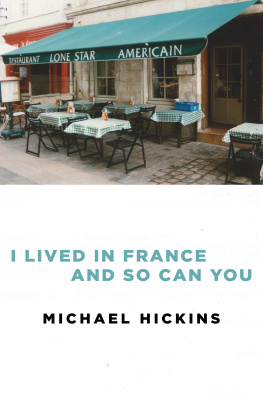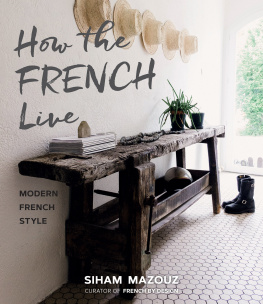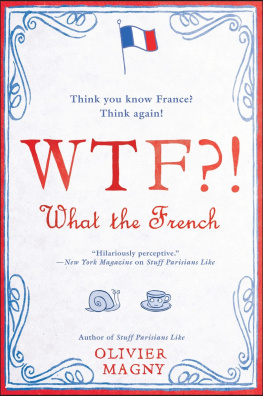For L.E.L.
In France, among a fickle wavering nation.
Driving and Breakfast
I was nineteen the first time Laurent Lemoine asked me to marry him. We had met in London when I was seventeen, the Christmas before my parents moved to Australia. A year later, he went to Sydney on business and took them out for an expensive dinner. It was a strange, old-fangled move but it achieved the desired effect. My mother rang me in a state of high excitement.
Hes gorgeous and hes definitely taken a shine to you!
My father, who finds it difficult to resist a man who picks up the bill, was no harder to win over.
Laurent was my eldest sister Florences flatmate. One day a French psychoanalyst would suggest that marrying him had been a form of deferred incest. I assume she meant between Florence and me, Laurent acting as a kind of stand-in (though using criteria this loose makes my whole family either perpetrators or victims of incest).
Florence had moved to France years before to escape her four younger sisters, and it would not be long before two of them decided to follow her: my elder sister Irene and, a year later, myself. Florence had brought Laurent to London for an English Family Christmas and he had settled into the sofa and played charades and watched our histrionics, interspersed, of course, with Quality British Television, as if he had been born to it. The sheer drama of my very female family had dazzled this brother of three, and his decision to marry me had, he later told me, been inextricably linked to his feeling of well-being that Christmas.
Laurents first proposal came half a year later, in the summer of 1984. I had come to the end of my first year at Oxford. The holidays had begun and I was signing on for unemployment benefit in London. My parents had moved to Sydney with our younger sister and precious only brother and I was still torn between a giddy sense of freedom and the vertigo of abandonment. In their absence I spent most holidays with my best friend, but she had recently become involved in an abusive relationship, which had turned me into a reluctant and unwelcome witness, so I was looking for a job and somewhere else to live until the autumn term began.
One evening, I went round to have dinner with two of my university friends. They were planning a train trip round Eastern Europe and their first stop would be Paris. They offered advice about places where I might find work. I knew that if the worst came to the worst, I could always go and live with my boyfriend in his parents house in Romford, but I was hoping to avoid this; our two-month-old relationship was already floundering and I was having escape fantasies. We had had a row three days before because he had caught me looking out of the window while we were having sex.
I spent the night with my two girlfriends, and the next morning, having nothing better to do, I went to Victoria Station with them to wave them off. At the time I hadnt identified my pathological reluctance to be left behind and, unaware of my motives, while they were waiting for their train, I cashed in my dole cheque and bought a ticket to Paris. I thought I would go for a week to stay with Florence and then come back and find work.
The three of us took the ferry to Calais and then sat on what felt like a ludicrously modern train to Paris, newly upholstered in orange and brown and festooned with noisy French children playing cards. When we arrived at the Gare du Nord, the sun was setting and the streets were still warm from the heat of the day. As we emerged from the station, the smell of desiccated dog shit wafted up from the pavements and the dizzying miasma of human urine hung in every dark corner. A few years later this would be a thing of the past, not because people had stopped pissing in dark corners or because they picked up their dogs excrement but because Jacques Chirac, the long-standing mayor of Paris, set up a proud drone army in fluorescent green overalls which daily sprayed the pavements with dirty water from the Seine, leaving a whole new olfactory imprint on the city.
My girlfriends caught the Metro to their youth hostel and I went in search of a call box. Florence was not in. I left a message on her answering machine, then I called the only other number I had in Paris, the number of Florences old flat. Laurent, of course, answered.
All?
Hello, Laurent. Its Lucy. Florences sister.
Ah Lu-ie! How are you? Are you coming in Paris?
(However good his English would become during our years together, he would always cling on to that quaint Gallicism: Welcome in Paris!)
I am in Paris. Im trying to get in touch with Fly but shes not answering her phone.
Its a long weekend. Shes probably out of town. Why dont you come here? Where are you?
Fifteen minutes later Laurent pulled up outside the Gare du Nord in his improbably small car, a navy-blue Fiat 500, leant across and opened the passenger door. I climbed in and he kissed me on both cheeks, or more accurately on each corner of my mouth. Then we sped off up into the cobbled streets of Montmartre to his flat.
The last time I had come to Paris, Laurent had taken me out to dinner, after cleverly informing my sister that he fancied me. We had sat in a cramped restaurant on the Ile de la Cit and he had spent most of the evening talking about his ex-girlfriend, Aurlie, who had just left him for somebody else. Laurent explained that out of the sack Aurlie had bored him but that in it, she was unsurpassable. I suppose that he was deliberately throwing down the sexual gauntlet but all this news did was terrify me, and cause lasting damage to my self-confidence. What he didnt mention at the time was that his erotic infatuation with Aurlie had driven him to spend most nights hammering on the door of her new lovers flat, just like a character from one of the many Nouvelle Vague films that Laurent would later encourage me to watch as part of my instruction in French culture and consciousness.
While Laurent made me a plate of spaghetti with Gruyre, I tried Florence again. She was back home and eager to see me. I ate the spaghetti and accepted his offer of a lift across town.
Driving in Paris, even before I passed my test, has always been a pleasurable experience for me. I have never had a problem with yielding to traffic coming from the right. Its just a matter of getting used to the possibility that at any moment a car might shoot out at you from the most insignificant side street, crash into you and then hold you responsible. This puzzling rule which has thwarted so many English motorists was, in fact, adopted by the International Automobile Convention in Paris in 1926, confirmed in Geneva in 1949 and then again in Vienna in 1968. Known in English as nearside priority, this diverting ritual, so deliciously contrary to common sense, is nowadays suited only to the Parisians. That evening Laurents own approach to this rule consisted of gaily tooting his horn at each intersection, like Noddy on speed. It was his way of warning everyone that he had no intention of conceding priority. The multitudes of reasonable roundabouts, which have since sprung up all over France, testify to the sad demise of this idiosyncratic driving rule.
The other distinctive feature of the Parisian motoring experience is of course the Place de lEtoile, a huge roundabout with Napoleons Arc de Triomphe in the middle, involving thirteen avenues, each one holding right of way. The Etoile has been written of endlessly as a symbol of French chaos. There are in fact rules rules that are redolent of the game chicken theyre just not the kinds of rules that come easily to Anglo-Saxon drivers.










